Uncover the hidden depths of Gershom, Moses' often overlooked son, and explore themes of exile, identity, and belonging in his biblical narrative.

Gershom in the Bible
Ah, Gershom: the biblical equivalent of being the first child left at the daycare of history, often glanced over amidst the grand tales of his father, Moses. You've probably skimmed over his name, nestled quietly in the narrative, but there's more to him than meets the eye.
As the son of a figure who conversed with burning bushes and parted seas, Gershom's story and the meaning behind his name offer a unique lens through which to view themes of exile, identity, and belonging. So, let's peel back the layers of this lesser-known character, and you might find yourself surprised at the richness hidden within his story.
Key Takeaways
- Gershom's name, meaning 'a stranger there,' reflects themes of displacement and resilience in foreign lands.
- As Moses' son, Gershom symbolizes the transition from slavery to freedom, mirroring the Israelites' exodus journey.
- His mixed Hebrew and Midianite heritage showcases the blending of cultures and influences on Israelite identity.
- Gershom's story in the scriptures underlines the importance of family, leadership, and cultural integration in religious narratives.
The Birth of Gershom
Gershom, the firstborn son of Moses, emerges in biblical narrative under circumstances that underscore his father's transient life and cultural intersections. His birth, while only briefly mentioned, is a significant event that reflects the broader themes of survival, adaptation, and resilience within a foreign land. As you delve into the context of Gershom's birth, it's essential to consider the role of midwifery practices prevalent at the time and how Zipporah's resilience played a critical part in the narrative.
Midwifery practices in ancient times were crucial for the survival of both mother and child. These practices, deeply rooted in community and tradition, often required a high level of skill and knowledge. Given the transient nature of Moses and Zipporah's life, it's likely that Zipporah had to rely on these traditional practices in the absence of a familiar support network. This situation underscores the adaptability and resilience required to navigate childbirth in uncertain conditions.
Furthermore, Zipporah's resilience is highlighted through her actions and decisions surrounding Gershom's birth. Living in a foreign land, away from her family and traditional support systems, Zipporah had to adapt quickly to her surroundings. Her ability to do so not only ensured the safe delivery of Gershom but also represented the strength and resilience of women who navigate childbirth under challenging circumstances.
In analyzing Gershom's birth, it becomes evident that this event is more than a mere footnote in biblical history. It represents the intersection of cultural practices, the importance of midwifery, and the indomitable spirit of resilience, as exemplified by Zipporah.
Gershom's Name and Meaning
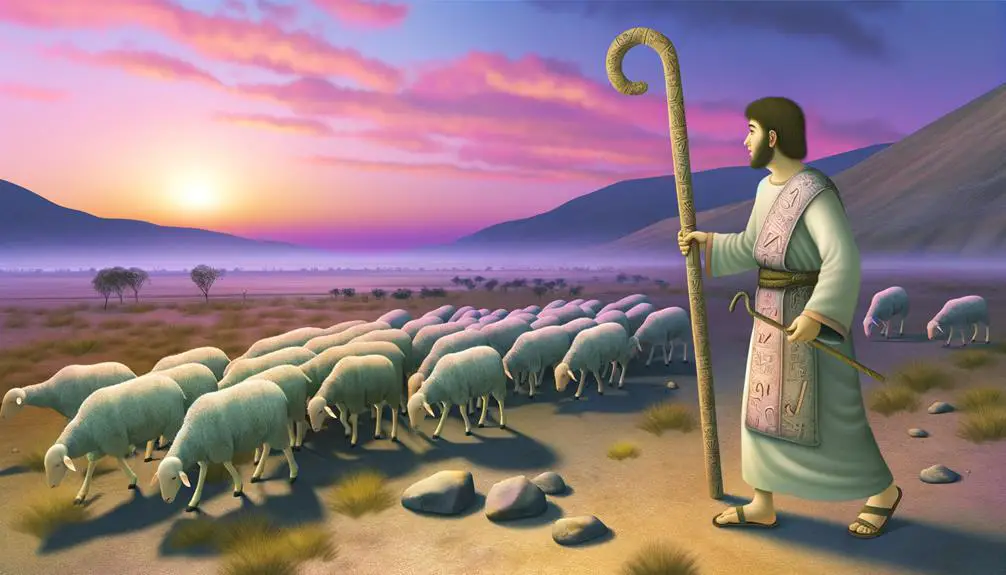
In exploring the significance of his name, it's revealed that 'Gershom' embodies a profound reflection of his father's experiences and sentiments during a period of exile and transition. Delving into biblical naming customs and the meticulous genealogical records preserved over centuries, one can discern the layers of meaning and historical context enveloping this name. Gershom, derived from the Hebrew, can be translated to mean 'a stranger there', a poignant reminder of his father's sojourn in a foreign land.
Analyzing the etymology of Gershom within the framework of ancient naming practices offers an insight into the personal narratives and cultural identities that these names sought to convey. Names weren't mere labels; they were imbued with stories, hopes, and prayers. Gershom's name, therefore, isn't just a reference to his father's physical displacement but also resonates with the emotional and spiritual estrangement experienced during this period.
Further scrutiny of genealogical records highlights the importance of names in tracing lineage and understanding familial relationships within biblical texts. Gershom's inclusion in these records isn't just a testament to his existence but serves as a bridge connecting the past with the present, offering a glimpse into the lives and legacies of those who came before.
In essence, the study of Gershom's name and its meaning unravels a rich tapestry of historical, cultural, and emotional significance. It reflects not only the personal history of his family but also the broader narrative of displacement, adaptation, and identity formation that characterizes much of human history.
Moses: Fatherhood in Exile
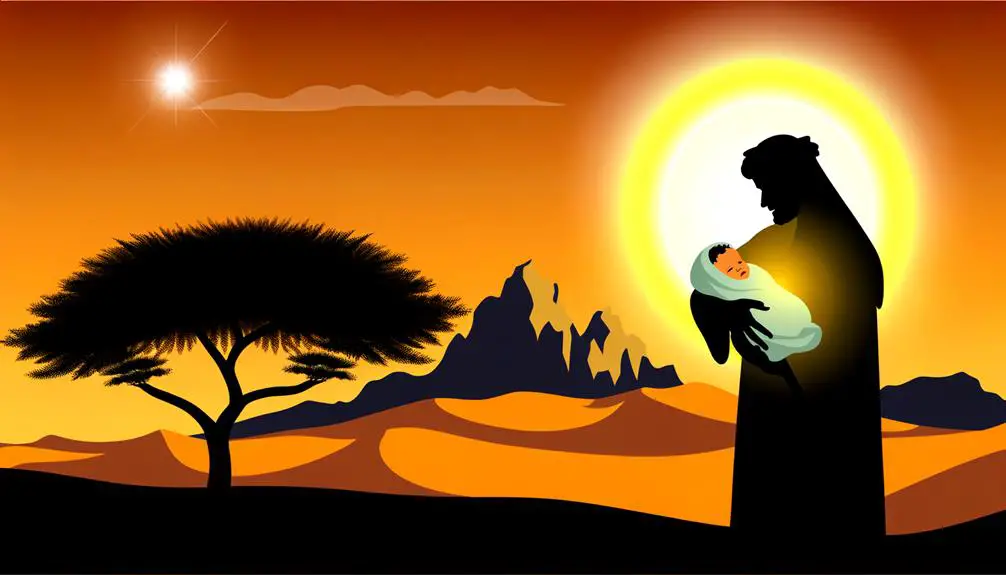
Moses's experience of fatherhood, forged in the crucible of exile, offers a unique lens through which to examine his leadership and legacy. Living in exile, Moses faced the formidable task of ensuring the survival of his family in the harsh desert landscape. This period of desert survival wasn't merely a test of physical endurance but also a profound lesson in leadership and reliance on divine providence.
The desert, with its relentless challenges, became a training ground for Moses. Here, he learned to navigate the complexities of leadership challenges, preparing him for the monumental task that lay ahead. The responsibility of fatherhood in such an environment demanded not only providing for his family's immediate needs but also instilling in them the resilience and faith necessary to thrive in adversity.
Moses's role as a father in exile thus mirrored his future role as the leader of the Israelites. The skills he honed during this time—resourcefulness, patience, and unwavering faith—were the very attributes that would define his leadership. His ability to guide his family through the trials of the desert foreshadowed his capacity to lead an entire nation through their own wilderness journey.
In this light, Moses's experience of fatherhood in exile becomes emblematic of his broader legacy. It underscores the intertwined nature of personal and communal leadership, illustrating how the challenges of desert survival and the navigation of leadership challenges were instrumental in shaping Moses's character and, by extension, the destiny of the Israelite people.
The Exodus and Gershom
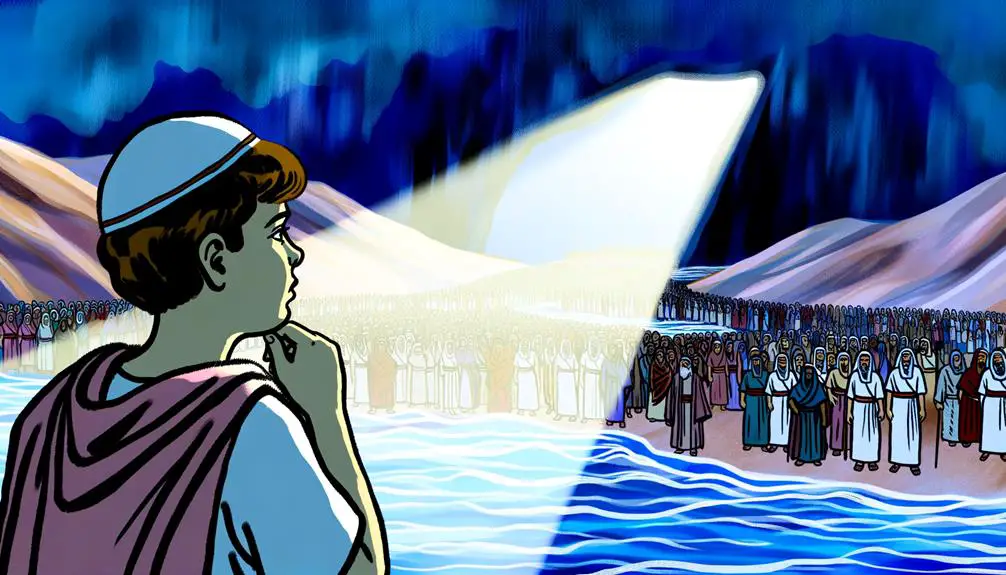
You'll find that Gershom's narrative in the context of the Exodus reflects a rich tapestry of personal and communal transformation. His name, meaning 'a stranger there,' encapsulates the Israelites' sojourn in a foreign land and their eventual liberation.
The journey of Gershom's family from Egypt to the Promised Land embodies themes of faith, identity, and divine providence.
Gershom's Birth Context
Gershom's birth unfolds against the backdrop of the Exodus, an event that not only shaped the destiny of the Israelites but also deeply influenced his personal and familial narrative. Within this extraordinary context, Midianite hospitality emerges as a pivotal element, particularly through Zipporah's role.
As Moses' wife, Zipporah's intersection with this narrative underscores the complexities of identity, belonging, and the intercultural exchanges that defined this period. Her actions and the support of her Midianite family provided a crucial sanctuary for Moses, facilitating Gershom's birth in a setting far removed from the Egyptian oppression.
This environment, marked by both refuge and transition, foregrounds the intricate dynamics at play during the formative years of Gershom's life.
Name Significance
Reflecting on the birth context of Gershom, it becomes evident that the significance of his name offers profound insights into the Exodus narrative and its impact on his identity.
Naming practices in ancient cultures, particularly among the Israelites, weren't arbitrary but laden with meaning, encapsulating personal and collective experiences.
Gershom's name, rooted in the Hebrew for 'a stranger there,' highlights the transient state of his family and foretells the Israelites' wider journey of migration and identity formation.
The cultural etymology of Gershom's name, thus, serves as a poignant reminder of the themes of displacement and divine providence that pervade the Exodus story, weaving individual narratives into the collective memory of a people on a path to nationhood.
Family's Exodus Journey
As the family of Moses embarked on their exodus from Egypt, Gershom's presence among them underscored the transformative journey of a people transitioning from slavery to freedom. Gershom, as a figure born into a lineage of Hebrews and Midianites, represented a blend of cultures and traditions. His upbringing, influenced by Midianite customs through his mother, Zipporah, highlighted the intercultural exchanges that shaped the identity of the Israelites during their formative years in the wilderness.
Zipporah's role, particularly, was significant in integrating Midianite practices with the evolving Hebrew culture, suggesting a synthesis of beliefs and rituals. This confluence of traditions enriched the communal life of the Israelites, preparing them for the challenges ahead as they forged a new identity in a land promised to them.
Gershom's Scriptural Appearances
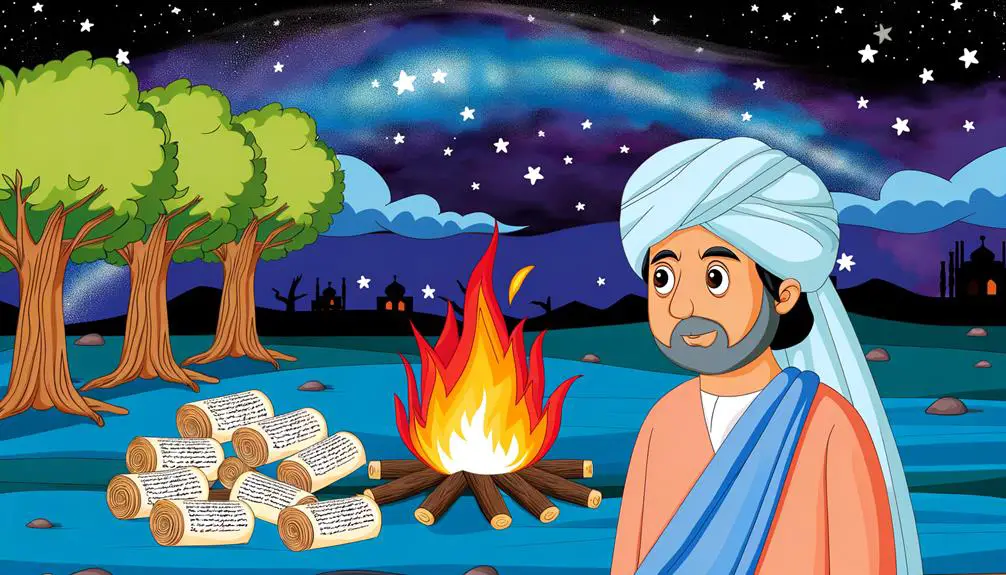
One encounters Gershom within the biblical narrative primarily in the Book of Exodus, where his birth and lineage are detailed with noteworthy significance. As the firstborn son of Moses and Zipporah, Gershom represents a critical link in the priestly lineage, underscoring the continuity of sacred responsibilities across generations. His name, meaning 'a stranger there,' reflects Moses' own sense of alienation in Midian, where Gershom was born. This connection to Moses' personal history and Gershom's eventual role in the Israelite community provides a rich tapestry for understanding his scriptural appearances.
- Exodus 2:22: Introduces Gershom as Moses' firstborn, marking the beginning of Moses' familial responsibilities.
- Exodus 18:3: Reiterates Gershom's identity and the significance of his name, embedding him within the narrative of Moses' exile and return.
- 1 Chronicles 23:15-16: Lists Gershom among Moses' descendants, emphasizing his role in the priestly lineage.
- Judges 18:30: Suggests a continuation of Gershom's line, although interpretations vary regarding the identity of this Gershom.
Gershom's scriptural appearances, though sparse, highlight his role as a bridge between Moses' leadership and the priestly duties carried on by his descendants. His presence in these texts, alongside mentions of Gershom's siblings, reinforces the importance of family ties and lineage within the Israelite community. Analyzing these appearances offers insights into the complexities of biblical genealogies and the foundational roles individuals like Gershom play in the broader narrative of faith and leadership.
Cultural and Religious Significance

You'll find that Gershom's heritage impacts both cultural identities and religious narratives within scriptural contexts.
His role in rituals and traditions showcases the evolving nature of worship practices and community commemorations.
Lastly, symbolic interpretations of Gershom today reflect contemporary quests for meaning and belonging within ancient texts.
Gershom's Heritage Impact
Gershom's heritage profoundly influences both cultural and religious landscapes, shaping traditions and beliefs across generations. This impact is notable in several areas:
- Parental Reflections: Gershom's lineage offers a mirror into the expectations and roles within family structures, embodying the ideals of honor and duty.
- Ancestral Connections: His story connects individuals to their historical roots, fostering a sense of belonging and identity.
- Cultural Identity: The narrative of Gershom reinforces cultural continuity, serving as a bridge between past and present.
- Spiritual Insights: Insights derived from his life story enrich religious understanding and practice.
- Community Bonds: Gershom's heritage underscores the importance of communal ties, emphasizing shared history and values.
Analyzing Gershom's contributions reveals a multifaceted impact on both personal and communal levels, reinforcing the intertwined nature of culture and faith.
Rituals and Traditions Influence
Building on the understanding of Gershom's heritage, it's crucial to explore how rituals and traditions stemming from his lineage have shaped cultural and religious landscapes. Ceremonial practices and historical ceremonies offer deep insights into the beliefs and values of communities, reflecting their devotion and spiritual orientation.
Ceremonial Practices |
Impact |
|---|---|
Ritual circumcision |
Reinforces community identity and spiritual dedication |
Passover Seder |
Commemorates liberation and divine intervention |
Sabbath observance |
Promotes rest, family bonding, and spiritual reflection |
Festival of Weeks |
Celebrates harvest and divine provision |
Day of Atonement |
Facilitates communal repentance and reconciliation |
These traditions, deeply rooted in Gershom's heritage, continue to influence not only religious observance but also cultural identity, underscoring the enduring legacy of ancient practices in contemporary contexts.
Symbolic Interpretations Today
In contemporary society, the symbolic interpretations of rituals and traditions originating from Gershom's lineage offer a profound window into the cultural and religious significance that continues to shape identities and beliefs. These interpretations provide insights into:
- The importance of personal growth and evolution within a faith context.
- Strengthening communal identity through shared historical and spiritual narratives.
- The role of tradition in connecting present communities with their ancestral past.
- The impact of religious teachings on ethical and moral decision-making.
- How rituals serve as a bridge between the physical and spiritual realms, facilitating a deeper understanding of one's place within the broader cosmic order.
This analytical exploration underscores the enduring relevance of Gershom's story in fostering a sense of belonging and purpose among individuals and communities alike.
Gershom's Legacy in Modern Interpretation

Reflecting on the biblical figure of Gershom reveals his enduring influence on contemporary theological discourse and cultural interpretations. You're drawn into a narrative where Gershom's descendants and their modern parallels become a focal point, illuminating the bridge between ancient texts and present-day reflections. This analysis not only deepens your understanding of biblical lineage but also invites you to consider how these ancient narratives resonate within modern contexts, challenging and enriching contemporary theological thought.
Aspect |
Ancient Significance |
Modern Interpretation |
|---|---|---|
Identity |
Firstborn of Moses, symbol of exile and diaspora |
Emblem of multicultural identity and interfaith dialogue |
Name's Meaning |
"A stranger there" |
Reflection on alienation and belonging in today's society |
Inheritance |
Did not inherit leadership like his younger brother Eliezer |
Illustrates shifts in traditional roles and recognition |
Role in Scripture |
Marginal yet pivotal |
Inspires discussions on the significance of seemingly minor figures |
Cultural Impact |
Influenced Levitical duties |
Inspires artistic and literary exploration of heritage and duty |
This table evokes a sense of connection across millennia, underscoring how Gershom's story, while ancient, speaks volumes about identity, belonging, and the evolution of societal roles. His legacy, though rooted in biblical times, continues to inspire and challenge individuals today, encouraging a richer, more nuanced exploration of faith, heritage, and the human condition. Through examining Gershom's descendants and drawing modern parallels, you're invited to engage with the past in a manner that illuminates the complexities of contemporary life, offering insights that are both profound and universally applicable.
Frequently Asked Questions
How Does Gershom's Story Compare to Those of His Contemporaries in Other Ancient Cultures?
You're diving into comparing ancient narratives, focusing on cultural parallels and mythological similarities. Without specific biblical contexts, you'll find that stories like Gershom's resonate with themes of exile, divine encounters, and identity crises, common across ancient cultures.
These elements not only highlight the universality of human experiences but also underscore the interconnectedness of mythologies. Analyzing these stories side by side, you'll uncover a rich tapestry of human belief and understanding that transcends individual cultures.
Are There Any Archaeological Findings Linked Specifically to Gershom or His Descendants?
You're probably wondering if there's any tangible evidence tied to Gershom or his lineage. So far, archaeologists haven't unearthed Gershom inscriptions or cultural artifacts that can be directly linked to him or his descendants.
This lack of physical evidence makes it challenging to compare or contrast his story with those from other ancient cultures. Without concrete findings, scholars rely on textual analysis and historical context to understand his significance.
How Has Gershom Been Depicted in Religious Artworks and Literature Outside the Bible?
You'll find that Gershom's depictions in religious artworks and literature beyond the Bible vary widely. Modern interpretations and artistic representations often reflect the cultural and theological priorities of the time, diverging significantly from biblical narratives.
These depictions can range from traditional iconography in ancient texts to more abstract or conceptual representations in contemporary art. Scholars analyze these portrayals to understand how religious figures are reimagined and their significance in different cultures and eras.
What Are Some Lesser-Known Rabbinic Commentaries or Midrashim About Gershom's Life and Actions?
You're diving deep into discussions on Gershom's lineage, seeking lesser-known Midrash interpretations. Scholars scrutinize stories, sifting through ancient annals to analyze his actions.
This scholarly search sheds light on Gershom's character beyond basic biblical narratives. By examining esoteric exegeses, you uncover unique views on his life, revealing the richness of rabbinic commentary.
This analytical approach allows for a comprehensive understanding of his contributions and complexities within the tapestry of tradition.
How Do Different Christian Denominations Interpret Gershom's Role and Significance Within the Broader Context of Biblical History?
You're exploring how Christian denominations view Gershom's role in biblical history.
It's fascinating to see how his lineage influences these perspectives. Each denomination brings its own unique lens to interpret his significance, blending tradition with theological analysis.
While some may emphasize his symbolic contributions to faith and identity, others might delve into the historical context of his actions.
This rich tapestry of denominational perspectives offers a deep, nuanced understanding of his place in the narrative.
Conclusion
In conclusion, Gershom emerges from the biblical narrative not merely as a character but as a colossal figure whose name reverberates through the annals of history, embodying the quintessence of exile and identity.
His story, though succinctly captured in the scriptures, unfolds like a vast tapestry, rich with cultural and religious significance that scholars have dissected for centuries.
Gershom's legacy, far from being a mere footnote in biblical scholarship, stands as a towering testament to the enduring power of names and heritage, challenging modern interpretation to delve deeper into the complexities of biblical characters.

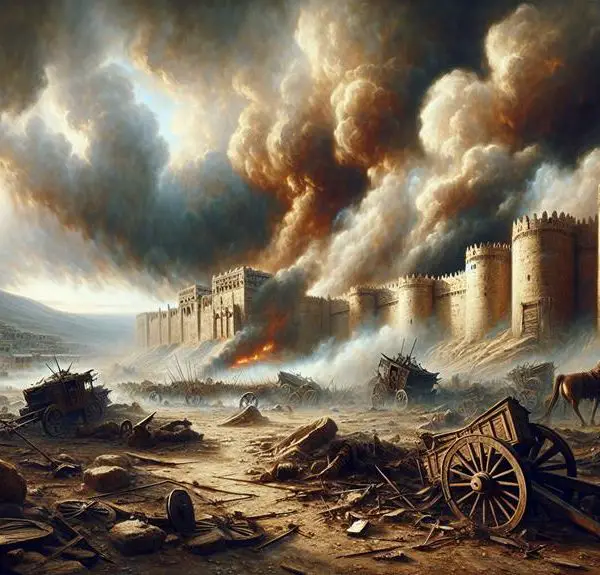

Sign up